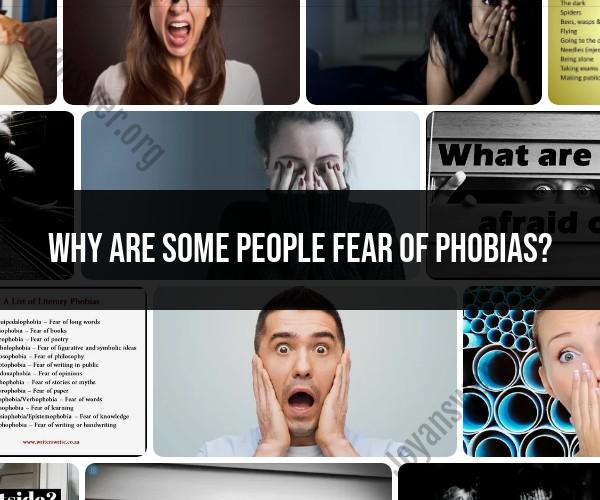Why are some people fear of phobias?
It's important to clarify that phobias and the fear of phobias are two distinct concepts. Phobias are specific and intense fears of particular objects, situations, or experiences. For example, common phobias include arachnophobia (fear of spiders), acrophobia (fear of heights), and claustrophobia (fear of confined spaces). Phobias are recognized as mental health conditions, and people with phobias experience excessive and irrational fear or anxiety when confronted with the object or situation that triggers their phobia.
The fear of phobias, on the other hand, is not a recognized psychological condition or term. It seems to be a paradoxical or contradictory concept because it implies that someone has a fear of having a fear (phobia), which is not a common psychological phenomenon. However, we can explore related psychological concepts:
Anxiety and Worry: Some people may experience heightened anxiety or worry about the possibility of developing a phobia or encountering situations that trigger intense fear. This anxiety can be related to a general fear of the unknown or fear of losing control over their emotions.
Vicarious Learning: People can develop fears or anxieties through vicarious learning, where they observe others experiencing phobias or extreme fears. For example, a person may witness a family member or friend struggling with a specific phobia, leading them to become anxious about the same thing happening to them.
Generalized Anxiety Disorder: Some individuals have a predisposition to excessive worry and anxiety, which can extend to various aspects of life, including the fear of developing specific phobias. This generalized anxiety may be rooted in genetics, childhood experiences, or other factors.
Hypochondriasis: Hypochondriasis, now known as illness anxiety disorder, is a condition characterized by excessive worry about having a serious illness. Similarly, some individuals may have a heightened fear of developing mental health conditions, including phobias.
It's essential to recognize that fear and anxiety are complex emotions, and they can manifest in various ways. While the concept of "fear of phobias" may not align with traditional psychological terminology, it's possible for individuals to experience anxiety and apprehension about various aspects of their mental and emotional well-being. If these fears or anxieties are causing significant distress or impairment in daily life, it may be helpful to consult with a mental health professional for assessment and guidance.
Understanding the Psychology of Phobias: Causes and Triggers
Phobias are a type of anxiety disorder characterized by an intense and irrational fear of a specific object or situation. People with phobias may experience extreme anxiety and distress when exposed to their phobic trigger, even if they know that it is not dangerous.
The exact cause of phobias is unknown, but they are thought to be caused by a combination of genetic and environmental factors. Some people may be more prone to developing phobias due to their genetics, while others may develop a phobia after a traumatic experience.
There are a number of different types of phobias, including:
- Specific phobias: These are phobias of specific objects or situations, such as spiders, heights, or public speaking.
- Social anxiety disorder: This is a phobia of social situations, such as parties, meetings, or dating.
- Agoraphobia: This is a phobia of open spaces or of being in situations where escape may be difficult or embarrassing.
Overcoming Fear and Anxiety: Strategies for Dealing with Phobias
There are a number of different strategies that can be used to overcome phobias. These strategies include:
- Exposure therapy: This type of therapy involves gradually exposing yourself to your phobic trigger in a safe and controlled environment. Over time, this can help you to reduce your anxiety and fear.
- Cognitive-behavioral therapy (CBT): This type of therapy helps you to identify and challenge the negative thoughts and beliefs that contribute to your phobia.
- Relaxation techniques: Relaxation techniques such as deep breathing and meditation can help to reduce anxiety and promote relaxation.
Seeking Professional Help for Severe Phobias and Anxiety Disorders
If you have a severe phobia or anxiety disorder, it is important to seek professional help. A therapist can help you to develop a treatment plan that is right for you.
Treatment for phobias and anxiety disorders may include medication, therapy, or a combination of both. Medication can help to reduce the symptoms of anxiety, while therapy can help you to learn coping mechanisms and overcome your fears.
If you are struggling with a phobia or anxiety disorder, please know that you are not alone. There is help available, and you can overcome your fears.











